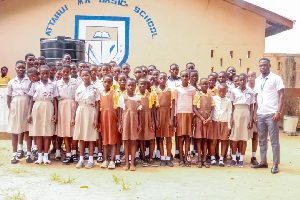Teenage pregnancy poses well-documented health risks and has social and economic repercussions for the individual, their family, community, and society at large.
In developing countries, including Ghana, approximately 21 million girls aged 15–19 become pregnant annually, with around 12 million giving birth each year. Reports indicate that 2.5 million girls under 16 years old give birth every year.
In Ghana, nearly three in ten girls experience pregnancy or have their first child before turning 18.
The majority of Ghanaians in rural areas live in poverty, unemployed, and reliant on subsistence farming. Child poverty is reportedly very high, necessitating stronger government policies and Child Support Grants (CSG) to alleviate poverty.
Research led by As I Grow NGO CEO, Debrah Bekoe Isaac, was initiated due to the increasing number of young girls dropping out of school, becoming wayward, and wandering malnourished with their babies.
The aim of the research is to highlight how poverty in Ghana's agrarian communities is eroding adolescents' livelihoods.
Qualitative research revealed that most girls lack funds for personal essentials like sanitary towels, underwear, and clothing, making them vulnerable to young men who offer support.
During interviews with students in Eastern Region areas, Debrah Bekoe Isaac found that seven out of ten participants admitted to being on their own, with parents lacking viable economic activities to earn wages. While acknowledging other contributing factors, participants agreed that poverty is the primary reason (80%) for teenage pregnancies.
It is recommended that children receive direct support from the government through education, and that issues of sexuality, teenage pregnancy, and poverty alleviation be incorporated into the curriculum starting at the Foundation Grades.
Mr. Debrah Bekoe Isaac also identified socio-economic factors as a major cause of teenage pregnancy in Ghana. High unemployment rates among parents and a lack of economic activity in rural areas leave parents unable to care for their children.
Girls in these situations often seek self-support, becoming targets for exploitation by men, such as Okada riders. Villages in Akuapem North Municipality, Okere District, Suhum Municipality, Kpandai District, and other areas visited by his organization face these challenges.
Mr. Debrah Bekoe Isaac urges the government, institutions, individuals, and NGOs to shift focus towards providing economic opportunities for parents in areas prone to teenage pregnancy.
He highlighted the numerous risks faced by adolescent mothers, including complications like hypertensive disorders, urinary tract infections, unsafe abortions, premature membrane rupture, STIs, poor nutrition, anemia, and cesarean delivery.
Adolescent mothers who undergo cesarean sections also risk complications like placenta previa, placental abruption, uterine rupture, and placenta accreta in future pregnancies.
Debrah Bekoe Isaac's organization, As I Grow NGO, supports adolescent girls in and out of school to overcome these challenges by organizing seminars, providing essentials, educational opportunities, training, and mentorship programs.
Regional News of Tuesday, 9 July 2024
Source: Debrah Bekoe Isaac, Contributor

















